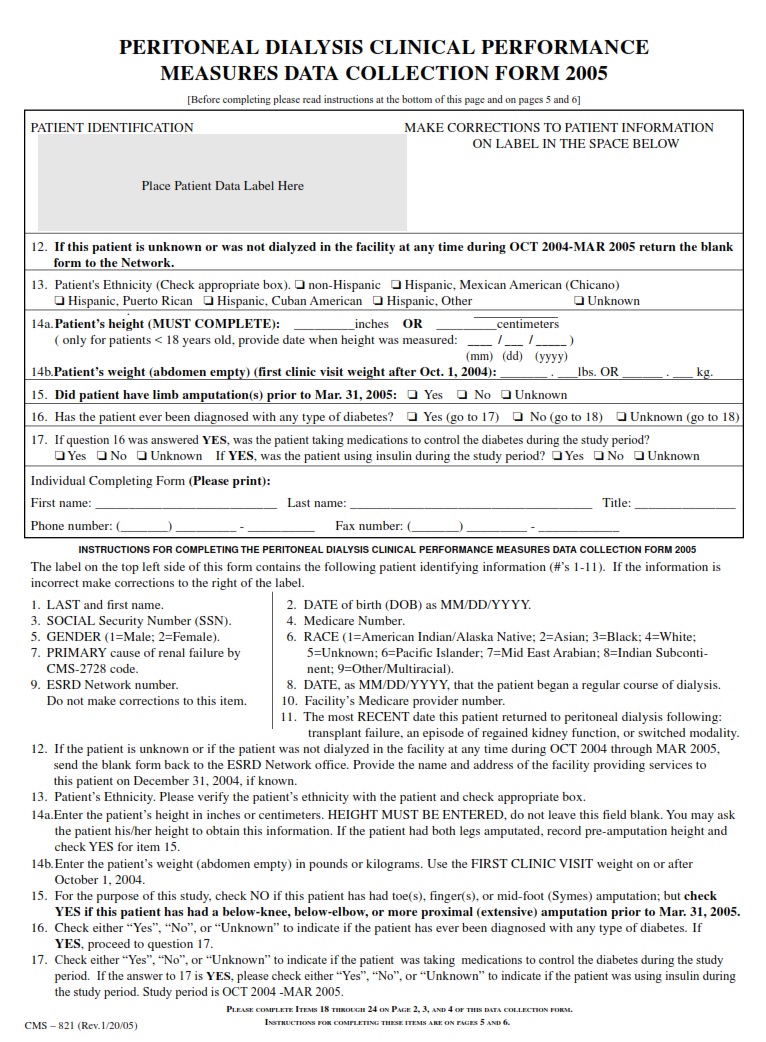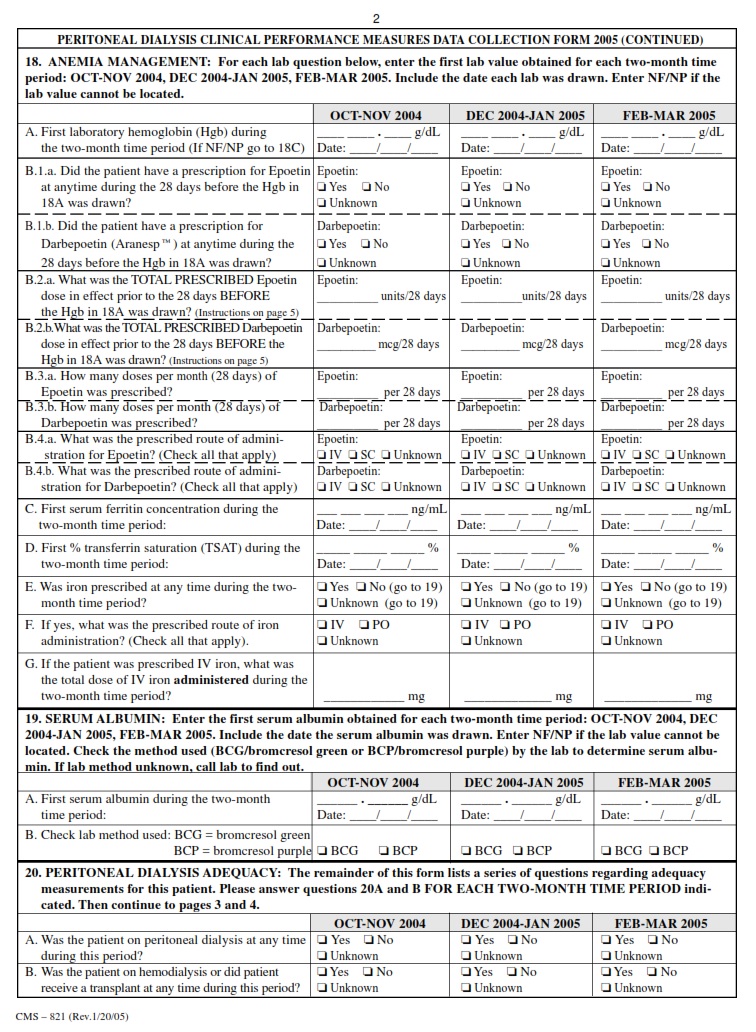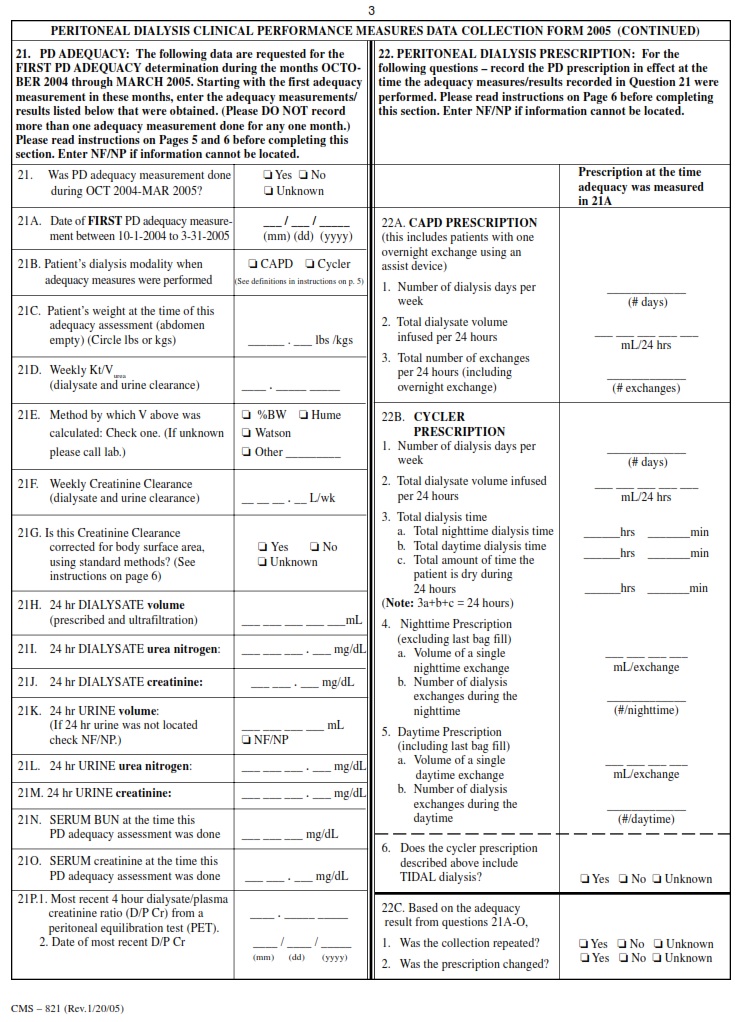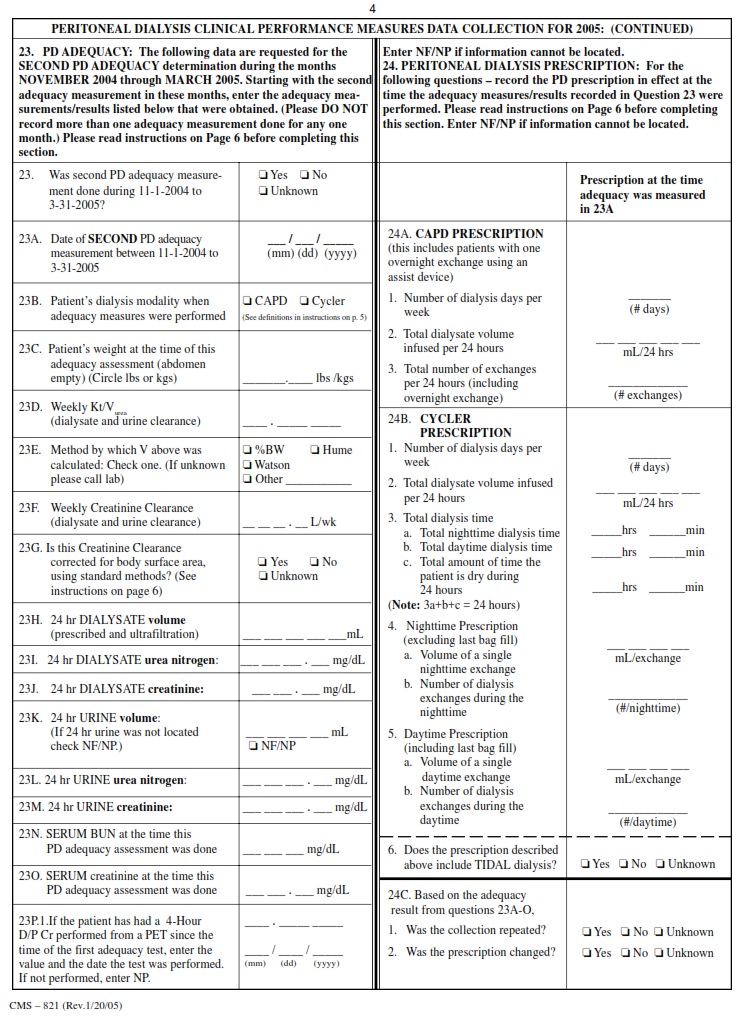CMSFORM.ORG – CMS 821 – PERITONEAL DIALYSIS CLINICAL PERFORMANCE MEASURES DATA COLLECTION FORM 2005 – In the intricate world of healthcare, the pursuit of excellence in patient care is an ongoing journey fueled by data-driven insights and meticulous analysis. Enter CMS 821 – a seemingly mundane form that holds within it the power to revolutionize the landscape of peritoneal dialysis clinical practices. As we delve into the depths of this unassuming document from 2005, we uncover a treasure trove of information that not only charts the course of patient outcomes but also serves as a beacon guiding healthcare professionals towards optimal performance measures. Join us on this enlightening exploration as we unravel the significance and impact of CMS 821 in shaping the future trajectory of peritoneal dialysis care, one data point at a time. Strap in, dear reader, for a journey through time and numbers that promises to unveil hidden gems within the realm of clinical performance evaluation like never before.
Download CMS 821 – PERITONEAL DIALYSIS CLINICAL PERFORMANCE MEASURES DATA COLLECTION FORM 2005
| Form Number | CMS 821 |
| Form Title | PERITONEAL DIALYSIS CLINICAL PERFORMANCE MEASURES DATA COLLECTION FORM 2005 |
| Published | 2005-01-01 |
| O.M.B. | – |
| File Size | 60 KB |
What is a CMS 821?
CMS 821, also known as the Peritoneal Dialysis Clinical Performance Measures Data Collection Form 2005, plays a crucial role in standardizing data collection for patients undergoing peritoneal dialysis. This form is designed to track specific metrics related to the clinical performance of peritoneal dialysis treatments, such as adequacy of dialysis dose, control of anemia and mineral metabolism, and prevention of infections. By consistently collecting and analyzing this data using CMS 821, healthcare providers can evaluate the effectiveness of their treatment protocols and identify areas for improvement in patient care.
One key advantage of utilizing CMS 821 is its ability to facilitate benchmarking efforts within the healthcare industry. By comparing clinical performance measures across different healthcare facilities, providers can assess their relative performance levels and implement best practices to achieve better outcomes for patients undergoing peritoneal dialysis. Furthermore, the structured nature of CMS 821 promotes transparency and accountability in healthcare delivery by ensuring that all relevant data points are documented accurately and comprehensively. In essence, CMS 821 serves as a vital tool in driving quality improvement initiatives and promoting optimal patient care in the field of peritoneal dialysis.
Where Can I Find a CMS 821?
For individuals in search of a CMS 821 form, they can typically be obtained from various sources such as healthcare facilities, medical supply companies, or directly from the Centers for Medicare & Medicaid Services website. These forms are essential for collecting crucial data related to peritoneal dialysis clinical performance measures in medical settings. Healthcare professionals rely on these forms to gather accurate and standardized information to assess the quality of care provided to patients undergoing peritoneal dialysis.
It is important for healthcare providers to comprehend the significance of accurately completing the CMS 821 form as it plays a vital role in evaluating the effectiveness of patient care practices. This form serves as a tool for monitoring outcomes, identifying areas of improvement, and ensuring compliance with clinical guidelines. By utilizing this data collection form effectively, healthcare organizations can enhance their overall performance and optimize patient outcomes in peritoneal dialysis treatments.
CMS 821 – PERITONEAL DIALYSIS CLINICAL PERFORMANCE MEASURES DATA COLLECTION FORM 2005
Peritoneal dialysis is a crucial treatment option for patients with end-stage renal disease, offering flexibility and convenience compared to hemodialysis. The CMS 821 Peritoneal Dialysis Clinical Performance Measures Data Collection Form of 2005 plays a pivotal role in ensuring quality care for these patients by collecting essential data that can drive improvements in clinical outcomes. This form serves as a valuable tool for healthcare providers to monitor and evaluate the effectiveness of peritoneal dialysis treatments, aiding in the identification of areas for enhancement and optimization.
By meticulously documenting key performance measures such as infection rates, adequacy of dialysis, and fluid management, healthcare teams can track trends over time and implement targeted interventions to enhance patient outcomes. The data captured through the CMS 821 form not only facilitates internal quality improvement initiatives within healthcare facilities but also enables benchmarking against national standards to drive overall excellence in peritoneal dialysis care delivery. Embracing this data-driven approach empowers healthcare providers to make informed decisions, optimize treatment protocols, and ultimately improve patient well-being and satisfaction throughout their peritoneal dialysis journey.
CMS 821 Example



